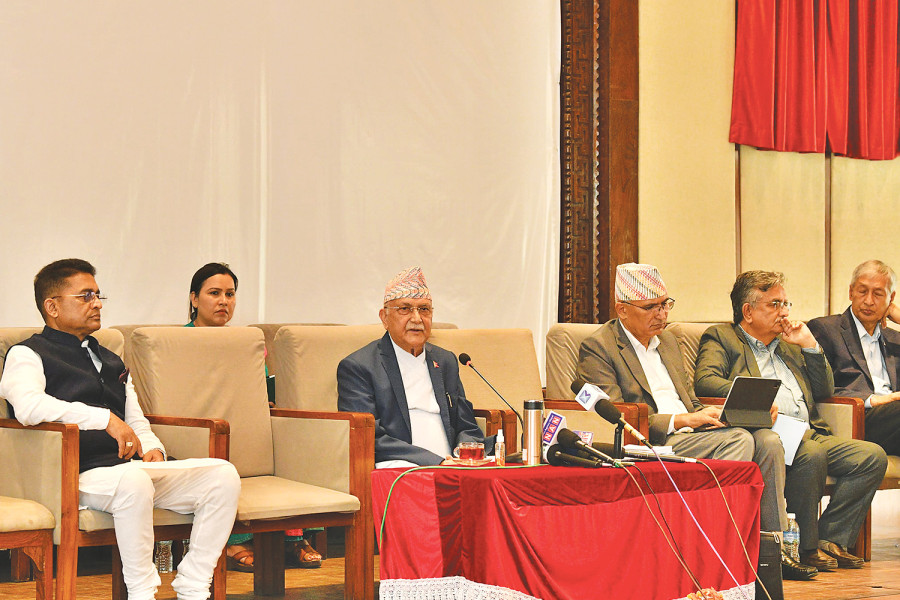Politics
UML chief Oli criticises budget for not pursuing socialism
The head of the main ruling party charges Finance Minister Pun with supposedly ignoring a core tenet of constitution.
Purushottam Poudel
KP Sharma Oli, the chairman of the major ruling partner CPN-UML, has accused Finance Minister Barsha Man Pun of failing to orient the government’s annual budget towards socialism as per the spirit of the constitution.
Addressing a UML parliamentary party meeting on Saturday, Oli pointed out the shortcomings in the budget preparation process and criticised the finance minister for not consulting the UML during its preparation.
The remarks by the chief of the largest party in the ruling coalition come as Parliament prepares to start deliberations on the budget, which Pun presented on May 28.
“What is the theoretical orientation of the budget, and where do we intend to go?” Oli asked the government led by CPN (Maoist Centre) Chairman Pushpa Kamal Dahal at the party meeting. “All these things should be discussed during deliberations in Parliament,” Oli said, instructing the party’s lawmakers as the parliamentary party leader.
The government did not increase allocation for social security schemes in the budget presented last week, and it did not introduce any new programmes for social security.
“If Oli read the inability to spend more on social security as the government’s failure to orient the budget along the constitutional goal of socialism, he is mistaken,” said a finance ministry official on condition of anonymity. “We are facing resource constraints to set aside more funds for such distributive programmes.”
“Socialism is a buzzword among communist parties. To be pragmatic, however, the funds available are not enough to introduce a socialism-oriented budget,” the officer told the Post.
Nepal’s new constitution, promulgated in 2015, envisions Nepal as a socialism-oriented country. Nonetheless, the private sector has been given control over all important facets of the public and economic spheres.
The Nepali Congress champions liberalisation and privatisation, but the party's guiding principle is democratic socialism. Other political parties, including the UML and other communist forces, follow a similar path.
Though the constitution mentions Nepal as a socialism-oriented democracy, the charter does not define socialism. Even Parliament has not considered the matter a topic of discussion. “There is a lot of confusion over what socialism actually means in our context,” Surendra Pandey, a former finance minister and vice-chair of the UML, told the Post.
Nepal’s political parties should compete in a production-oriented economy rather than a distributive one, Pandey suggested. “If we only focus on distribution-oriented fiscal policies, our economy will eventually stagnate.”
A look at world history shows that revolution and evolution are the two bases to achieve socialism, Pandey said. “After their revolutions, countries like France and China nationalised the properties of the erstwhile rulers and distributed them to the public apart from enacting other reforms in order to achieve socialism.”
In Nepal, “we need to abide by evolution-based reforms to attain socialism,” Pandey said. Many European countries follow this model. Incomes and properties of the rich are taxed to raise funds for social-security programmes, he added. “However, if we are looking for a distribution-oriented scheme for political gains, then it won’t yield significant results in the long run.”
Economists also believe that a socialism-oriented budget is unrealistic during a time of economic hardship. They say the budgets presented even by the erstwhile Oli-led governments were far from socialism-oriented.
Oli became prime minister two times: once after the promulgation of the constitution in 2015 and again after the first election held under the same constitution in 2017. The governments he led presented at least three budgets.
“Apart from running some fair-price shops or selling some goats and sheep on the occasion of Dashain-Tihar, no government in Nepal has taken any concrete steps to build a socialist-oriented community as mentioned in the constitution,” Dipendra Bahadur Chhetri, a former governor of the Nepal Rastra Bank, told the Post. “This was also true of the previous Oli-led governments.”
Chhetri said that the budget for the next fiscal year is conservative.
“The communist-led government is always criticised for its distribution-oriented budget, which comes to galvanise its populist agenda,” added Chhetri. “But it’s an illusion to believe that a distribution-oriented budget with a focus on social security schemes is the way towards socialism.”
Oli on Saturday instructed his party’s lawmakers to freely criticise the government if they find any instances of budget allocation in breach of the principle.
“As a ruling party, we support this budget and will help with its implementation,” Oli said. “However, this does not mean that we should not point out deficiencies in the budget.”
Addressing the parliamentary party meeting, Oli expressed his displeasure at lack of consultations among the ruling partners. He also raised the question of whether the budget was prepared by the finance minister himself or by the Maoist party he represents.
“The budget could have been much better if the finance minister had engaged in more extensive consultation with the coalition partners,” Oli said.
President Ramchandra Paudel presented the government’s policies and programmes in Parliament on May 14. In principle, the finance minister prepares the annual budget based on the policies and programmes and the feedback given by lawmakers during the deliberations on the policies and programmes.
However, the policies and programmes could not be discussed in Parliament this time owing to its prolonged obstruction by the main opposition Congress demanding a parliamentary probe in the cooperatives fraud.




 14.12°C Kathmandu
14.12°C Kathmandu














